when,while和as引导时间状语从句的用法
as when while的用法
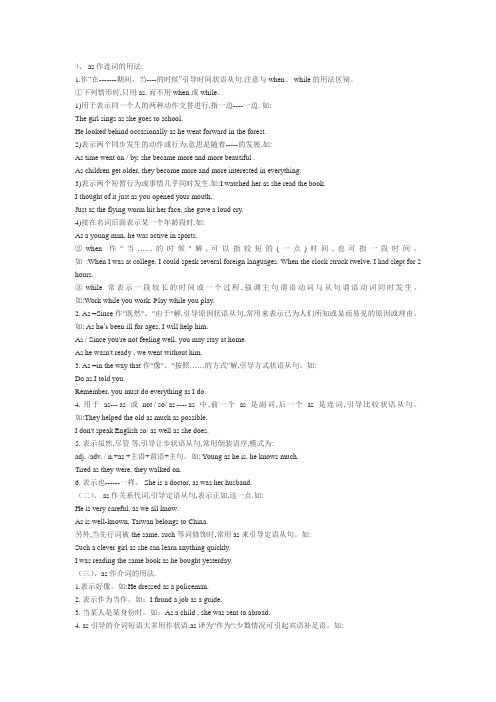
)、 as作连词的用法:1.作“在-------期间,当----的时候”引导时间状语从句.注意与when、 while的用法区别。
①下列情形时,只用as, 而不用when或while。
1)用于表示同一个人的两种动作交替进行,指一边----一边. 如:The girl sings as she goes to school.He looked behind occasionally as he went forward in the forest.2)表示两个同步发生的动作或行为,意思是随着-----的发展.如:As time went on / by, she became more and more beautiful .As children get older, they become more and more interested in everything.3)表示两个短暂行为或事情几乎同时发生.如:I watched her as she read the book.I thought of it just as you opened your mouth.Just as the flying worm hit her face, she gave a loud cry.4)接在名词后面表示某一个年龄段时.如:As a young man, he was active in sports.②when作"当……的时候"解,可以指较短的(一点)时间,也可指一段时间。
如:When I was at college, I could speak several foreign languages. When the clock struck twelve, I had slept for 2 hours.③ while常表示一段较长的时间或一个过程,强调主句谓语动词与从句谓语动词同时发生。
when,while,as引导时间状语从句的区别
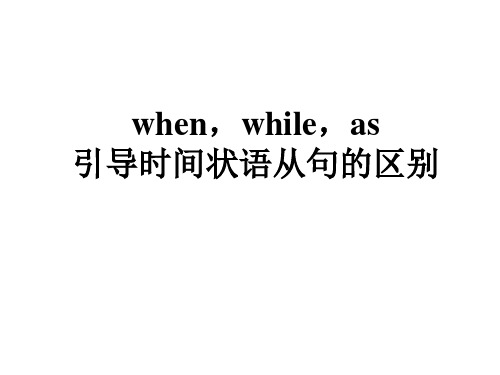
随着高度的增加,大气越来越稀薄。
③As years go by,China is getting stronger and richer.
②When /While /As she was making a phonecall,I was writing a letter. (make为延续性动词)当她在打电话时, 我正在写信。
3.当主句、从句动作同时进行,从句动 作的时间概念淡化,而主要表示主句动作 发生的背景或条件时,只能用 as。这时, as常表示“随着……”;“一边……,一 边……”之意。
随着时间一年一年过去,中国变得越
来越富强了。
④The little girls sang as they went. 小姑娘们一边走,一边唱。
4.在将来时从句中,常用when,且从 句须用一般时代替将来时。
①When the manager comes here for a visit next week,I’ll talk with him about this. 下周,经理来这参观时,我会和他谈谈此 事。
②When I got to the airport,the guests had left. (got to后发生)当我赶到飞机场时,客人 们已经离开了。
2.从句动作和主句动作同时发生,且从句 动作为延续性动词时,when,while,as都 可使用。
①When /While /As we were dancing,a stranger came in. (dance为延续性动词)当我们跳舞时,一 位陌生人走了进来。
英语中when、while、as引导时间状语从句的区别
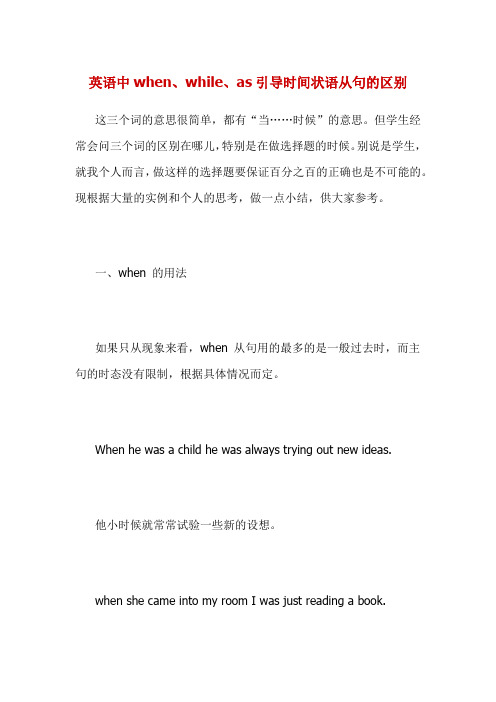
英语中when、while、as引导时间状语从句的区别这三个词的意思很简单,都有“当……时候”的意思。
但学生经常会问三个词的区别在哪儿,特别是在做选择题的时候。
别说是学生,就我个人而言,做这样的选择题要保证百分之百的正确也是不可能的。
现根据大量的实例和个人的思考,做一点小结,供大家参考。
一、when 的用法如果只从现象来看,when 从句用的最多的是一般过去时,而主句的时态没有限制,根据具体情况而定。
When he was a child he was always trying out new ideas.他小时候就常常试验一些新的设想。
when she came into my room I was just reading a book.她走进我房间时,我正在看书。
Were you writing when the teacher came in?老师进来的时候,你在写信吗?Sorry,I was out when you called me.对不起,你打电话来的时候我出去了。
He was on the point of leaving when someone knocked at the door.他正要走,这时有人敲门。
I thought of it just when you opened your mouth.就在你要说话的时候,我也想到了。
I had hardly[scarcely] closed my eyes when someone knocked at the door.我刚一闭上眼,就有人在敲门了。
根据以上的例句,我们可以总结出一点:when 从句的A事件,相当于另一个事件B发生的时间点。
也就是说,when 从句的重点不在动作本身发生的状态,而只是把它作为一个时间点,所以when 多数情况下用的是一般过去时,则不用正在进行时。
因为如果用正在进行时,它表示的就是一段时间而不是一个时间点了。
时间状语从句连词when, while, as
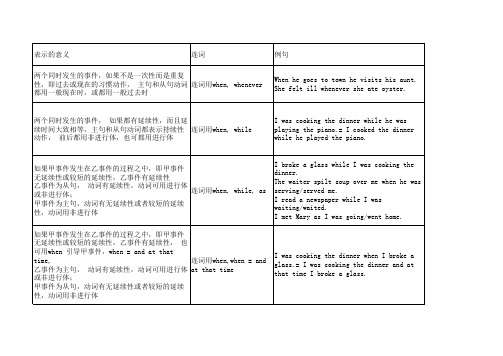
如果甲事件发生在乙事件的过程之中,即甲事件 无延续性或较短的延续性,乙事件有延续性 乙事件为从句, 动词有延续性,动词可用进行体 连词用when, while, as 或非进行体; 甲事件为主句,动词有无延续性或者较短的延续 性,动词用非进行体 如果甲事件发生在乙事件的过程之中,即甲事件 无延续性或较短的延续性,乙事件有延续性, 也 可用when 引导甲事件,when = and at that time, 连词用when,when = and 乙事件为主句, 动词有延续性,动词可用进行体 at that time 或非进行体; 甲事件为从句,动词有无延续性或者较短的延续 性,动词用非进行体
表示的意义
连词
例句
两个同时发生的事件,如果不是一次性而是重复 性,即过去或现在的习惯动作, 主句和从句动词 连词用when, whenever 都用一般现在时,或都用一般过去时
When he goes to town he visits his aunt. She felt ill whenever she ate oyster.
I broke a glass while I was cooking the dinner. The waiter spilt soup over me when he was serving/served me. I read a newspaper while I was waiting/waited. I met Mary as I was going/went home.
两个同时发生的事件, 如果都有延续性,而且延 续时间大致相等,主句和从句动词都表示持续性 连词用when, while 动作, 前后都用非进行体,也可都用进行体
I was cooking the dinner while he was playing the piano.= I cooked the dinner while he played the piano.
【英语知识点】when,while和as引导时间状语从句的用法
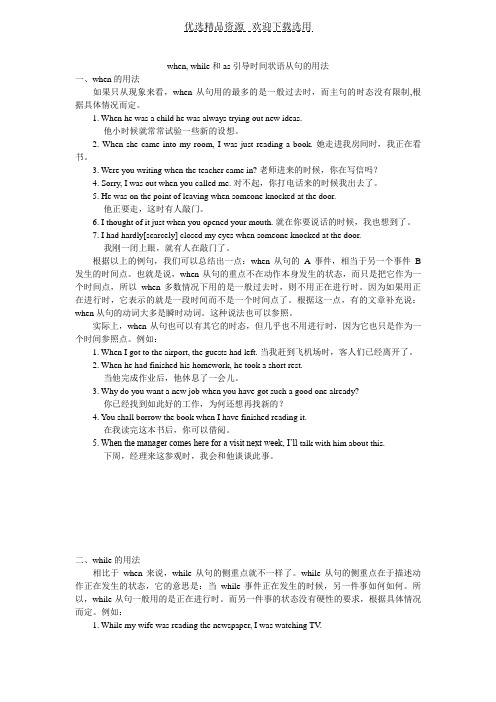
when, while 和 as 引导时间状语从句的用法一、when 的用法如果只从现象来看,when 从句用的最多的是一般过去时,而主句的时态没有限制,根据具体情况而定。
1. When he was a child he was always trying out new ideas.他小时候就常常试验一些新的设想。
2. When she came into my room, I was just reading a book. 她走进我房间时,我正在看书。
3. Were you writing when the teacher came in? 老师进来的时候,你在写信吗?4. Sorry, I was out when you called me. 对不起,你打电话来的时候我出去了。
5. He was on the point of leaving when someone knocked at the door.他正要走,这时有人敲门。
6. I thought of it just when you opened your mouth. 就在你要说话的时候,我也想到了。
7. I had hardly[scarcely] closed my eyes when someone knocked at the door.我刚一闭上眼,就有人在敲门了。
根据以上的例句,我们可以总结出一点:when 从句的A事件,相当于另一个事件B 发生的时间点。
也就是说,when 从句的重点不在动作本身发生的状态,而只是把它作为一个时间点,所以when 多数情况下用的是一般过去时,则不用正在进行时。
因为如果用正在进行时,它表示的就是一段时间而不是一个时间点了。
根据这一点,有的文章补充说:when 从句的动词大多是瞬时动词。
这种说法也可以参照。
实际上,when 从句也可以有其它的时态,但几乎也不用进行时,因为它也只是作为一个时间参照点。
while, when, as的用法
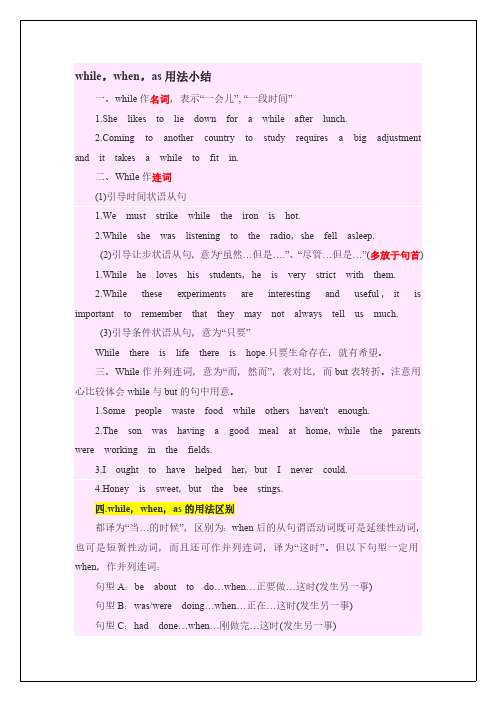
1.We were about to set out when it began to rain. 我们刚要出发天突然下雨了。 2.I was walking along the bank of the river when I fell into it. 我正沿河岸散步突然掉进水里。 3.He had hardly sat down when his mobile rang. 他刚一坐下手机就响了。 while 后的从句谓语动词只能是延续性动词,强调主从句的两个动词同时发 生;while 也可作并列连词,表示两个动作的对比,译为“而”,“然而”。 as 则表示两个变化中的动作的同时性,译为“一边…一边…”。 1.While his mother was cooking in the kitchen , the boy fell asleep in the chair. (在一个延续动作过程中发生另一个动作) 2.He hurried home,looking behind as he went. 他匆匆回家,边走边往后看。
while,when,as 用法小结
一、while 作名词,表示“一会儿”, “一段时间” 1.She likes to lie down for a while after lunch. ing to another country to study requires a big adjustment and it takes a while to fit in. 二、While 作连词 (1)引导时间状语从句 1.We must strike while the iron is hot. 2.While she was listening to the radio,she fell asleep. (2)引导让步状语从句,意为“虽然…但是….”、“尽管…但是…”(多放于句首) 1.While he loves his students,he is very strict with them. 2.While these experiments are interesting and useful , it is important to remember that they may not always tell us much. (3)引导条件状语从句,意为“只要” While there is life there is hope.只要生命存在,就有希望。 三、While 作并列连词,意为“而,然而”,表对比,而 but 表转折。注意用 心比较体会 while 与 but 的句中用意。 1.Some people waste food while others haven't enough. 2.The son was having a good meal at home,while the parents were working in the fields. 3.I ought to have helped her,but I never could. 4.Honey is sweet,but the bee stings. 四.while,when,as 的用法区别 都译为“当…的时候”,区别为:when 后的从句谓语动词既可是延续性动词, 也可是短暂性动词,而且还可作并列连词,译为“这时”。但以下句型一定用 when,作并列连词: 句型 A:be about to do…when…正要做…这时(发生另一事) 句型 B:was/were doing…when…正在…这时(发生另一事) 句型 C:had done…when…刚做完…这时(发生另一事)
英语学习:while,when,as三者引导的时间状语从句

【导语】时间状语从句算是状语从句中最简单的⼀类,也是我们⽇常⽣活交流中最常⽤的⼀类,虽然难度不⼤,但引导词也不少,仍然有不少同学会弄混那⼏个常见引导词的⽤法,为⼤家带来as,when,while这⼏个词的辨析⽅法,⼀起看看吧。
三者可表⽰“当……时候”,区别如下:(1) 若主句表⽰的是⼀个短暂性动作,从句表⽰的是⼀个持续性动作,三者都可⽤:He fell asleep when [while, as] he was reading. 他看书时睡着了。
【注】as ⽤于引出⼀个持续性动词表⽰“在……期间”时,其谓语通常只能是那些含有动作(action)和发展(development) 意味的动词,⼀般不能是那些不⽤于进⾏时态的动词(如 be, seem, love, want, agree, see, know, have 等),所以下⾯⼀句中的 while 不能换为 as:A:I’m going to the post office. 我要去邮局。
B:While you’re there, can you get me some stamps? 当你在邮局时,能帮我买⼏张邮票吗?(2) 若主、从句表⽰两个同时进⾏的持续性动作,且强调主句表⽰的动作延续到从句所指的整个时间,通常要⽤ while:Don’t talk while you’re eating. 吃饭时不要说话。
I kept silent while he was writing. 在他写的时候,我默不作声。
但是,若主从句表⽰的两个同时进⾏的动作含有“⼀边…⼀边”之意思,通常⽤ as:She sang as she went along. 她边⾛边唱。
(3) 若从句是⼀个短暂性动作,主句是⼀个持续性动作,可⽤ as / when 但不⽤ while:It was raining hard when [as] we arrived. 我们到达时正下着⼤⾬。
Grammar when,while,as引导时间状语从句的区别

3.当主句、从句动作同时进行,从句动作的时间概念淡化,而主要表示主句动作发生的背景或条件时,只能用 as。这时,as常表示"随着..之意。
② Sorry,I was out when you called me.(call为短暂性动词)对不起,你打电话时我刚好外出了。
③ Strike while the iron is hot.(is为延续性动词,表示一种持续的状态)趁热打铁。
④ The students took notes as they listened.(listen为延续性动词)学生们边听课边做笔记。
二、when从句的谓语动词可以在主句谓语动作之前、之后或同时发生;while和as从句的谓语动作必须是和主句谓语动作同时发生。
1.从句动作在主句动作前发生,只用 when。
①When he had finished his homework,he took a short rest.(finished先发生)当他完成作业后,他休息了一会儿。
A. as B. since C. until D. before.
11 ____ he grew older he became interested in gardening.
A. As B. That C. During D. If
12 ---How long has your family lived here ?
有些人很费粮食,然而有些人却吃不饱。
The son was having a good meal at home,while the parents were working in the fields.
as while when引导时间状语从句的区别

AS,WHILE,WHEN引导时间状语从句的区别噫,说起AS、WHILE、WHEN这三个词儿,它们在句子里头引导时间状语从句的时候,差别还是挺大的哟。
AS嘛,就好比说“跟到……一样”,它强调的是两个动作或者事情同时发生,不分先后,就像你吃饭跟到看电视一样,同时进行。
比如说,“As I was walking down the street,I saw a cat.”就是说“我走在街上的时候,看到了一只猫。
”,这里走路跟到看到猫是同时发生的。
WHILE呢,它有点“在……期间”的意思,也是说两个动作同时进行,但是它更侧重于强调一个动作在另一个动作持续进行的期间内发生。
比如说,“While I was studying,my roommate was sleeping.”就是说“我在学习的时候,我室友在睡觉。
”,这里强调的是学习这个动作的持续期间内,室友在睡觉。
WHEN呢,它就比较灵活了,可以表示“当……的时候”,既可以指两个动作同时发生,也可以指一个动作在另一个动作之前或者之后发生。
比如说,“When I got home,I found my keys were missing.”就是说“我回到家的时候,发现我的钥匙不见了。
”,这里回家跟到发现钥匙不见了,就有先后顺序了。
所以说,AS、WHILE、WHEN虽然都是引导时间状语从句的词儿,但是它们的意思和用法还是有区别的,咱们得根据句子的意思来选择合适的词儿哈。
状语从句中的when,while,as用法汇总

状语从句中的when, while 和as 的用法一.when ,while ,as 在时间状语从句中的区别: ①三者均可表示“当……的时候”,如果主句表示的是短暂的动作,如果主句表示的是短暂的动作,而从句表示而从句表示而从句表示 的是一段时间,三者可通用。
如:的是一段时间,三者可通用。
如:I met Kang Li as /when /while I was walking along the street .当我沿街散步时碰见了康丽。
当我沿街散步时碰见了康丽。
②when 可以和延续性动词连用,也可以和短暂性动词连用;而while 和as 只能和延续性动词连用。
能和延续性动词连用。
如:如:It was snowing when we got to the airport .当我们到达机场时,天正下着雪。
(不能用while )③as 强调主句与从句表示的动作同时发生,as 常表示“随着……”;“一边……,一边……;while 强调主句表示的动作持续于while 所指的整个时间内;when 可指主、从句所述动作同时或先后发生。
如:可指主、从句所述动作同时或先后发生。
如:As the time went on ,the weather got worse .(as 表示“随着……”之意)之意) He sang as he went along .他边走边唱。
.他边走边唱。
Please write while I read .我读的时候,请写下来。
.我读的时候,请写下来。
When he reached home ,he had a little rest .回到家后,他休息了一会儿。
.回到家后,他休息了一会儿。
④when 用于表示“一……就……”的句型中(指过去的事情)。
的句型中(指过去的事情)。
somebody had hardly (=scarcely ) done …when ......=Hardly / Scarcely had somebody done …when ......①I had hardly /scarcely closed my eyes when someone knocked at the door .=Hardly /Scarcely had I closed my eyes when someone knocked at the door .我刚一闭上眼,就有人在敲门了。
When,While,As引导时间状语从句的区别
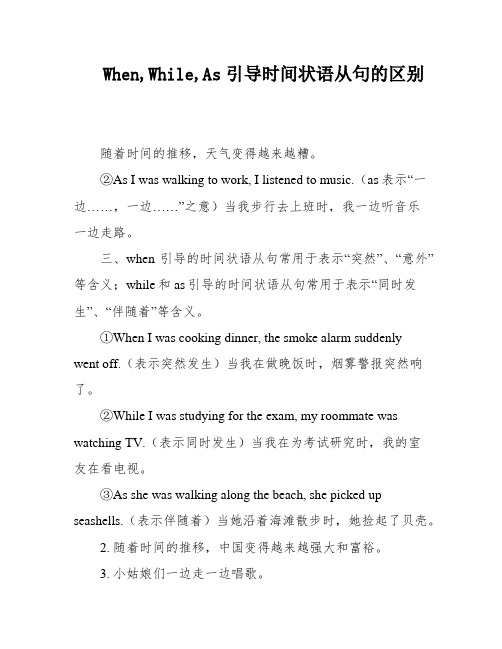
When,While,As引导时间状语从句的区别
随着时间的推移,天气变得越来越糟。
②As I was walking to work, I listened to music.(as表示“一边……,一边……”之意)当我步行去上班时,我一边听音乐
一边走路。
三、when引导的时间状语从句常用于表示“突然”、“意外”等含义;while和as引导的时间状语从句常用于表示“同时发生”、“伴随着”等含义。
①When I was cooking dinner, the smoke alarm suddenly
went off.(表示突然发生)当我在做晚饭时,烟雾警报突然响了。
②While I was studying for the exam, my roommate was watching TV.(表示同时发生)当我在为考试研究时,我的室
友在看电视。
③As she was walking along the beach, she picked up seashells.(表示伴随着)当她沿着海滩散步时,她捡起了贝壳。
2. 随着时间的推移,中国变得越来越强大和富裕。
3. 小姑娘们一边走一边唱歌。
5. 伤心的母亲坐在路边,一边哭一边喊叫。
1. 当我读完这本书后,你可以借阅。
2. 下周经理来参观时,我会和他谈论这个问题。
时间状语从句例子
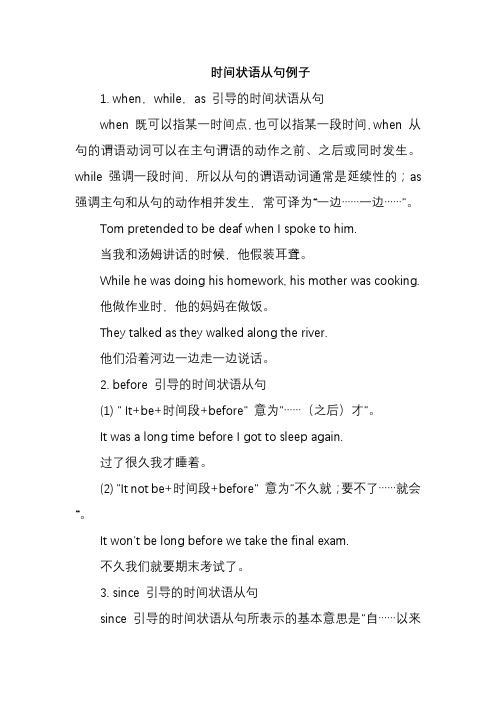
时间状语从句例子1. when,while,as 引导的时间状语从句when 既可以指某一时间点,也可以指某一段时间,when 从句的谓语动词可以在主句谓语的动作之前、之后或同时发生。
while 强调一段时间,所以从句的谓语动词通常是延续性的;as 强调主句和从句的动作相并发生,常可译为“一边……一边……”。
Tom pretended to be deaf when I spoke to him.当我和汤姆讲话的时候,他假装耳聋。
While he was doing his homework, his mother was cooking.他做作业时,他的妈妈在做饭。
They talked as they walked along the river.他们沿着河边一边走一边说话。
2. before 引导的时间状语从句(1) " It+be+时间段+before" 意为"……(之后)才”。
It was a long time before I got to sleep again.过了很久我才睡着。
(2) "It not be+时间段+before" 意为”不久就;要不了……就会“。
It won't be long before we take the final exam.不久我们就要期末考试了。
3. since 引导的时间状语从句since 引导的时间状语从句所表示的基本意思是”自……以来“。
I have been looking forward to seeing you since I saw you last.自我上次见到你以来我就一直想见到你。
He has written to me frequently since I was ill.自从我病愈后,他屡次给我写信。
(从句谓语为状态动词)He has written to me frequently since I fell ill.自从我生病以来,他屡次给我写信。
时间状语从句when,while和as的用法
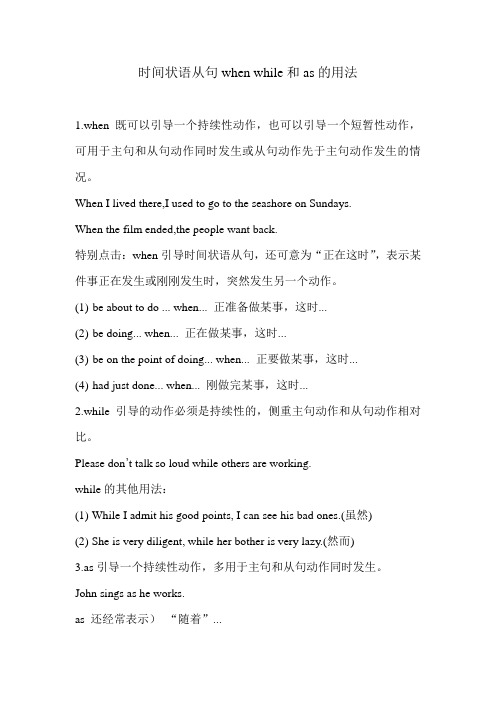
时间状语从句when while和as的用法1.when既可以引导一个持续性动作,也可以引导一个短暂性动作,可用于主句和从句动作同时发生或从句动作先于主句动作发生的情况。
When I lived there,I used to go to the seashore on Sundays.When the film ended,the people want back.特别点击:when引导时间状语从句,还可意为“正在这时”,表示某件事正在发生或刚刚发生时,突然发生另一个动作。
(1)be about to do ... when... 正准备做某事,这时...(2)be doing... when... 正在做某事,这时...(3)be on the point of doing... when... 正要做某事,这时...(4)had just done... when... 刚做完某事,这时...2.while引导的动作必须是持续性的,侧重主句动作和从句动作相对比。
Please don’t talk so loud while others are working.while的其他用法:(1)While I admit his good points, I can see his bad ones.(虽然)(2)She is very diligent, while her bother is very lazy.(然而)3.as引导一个持续性动作,多用于主句和从句动作同时发生。
John sings as he works.as 还经常表示)“随着”...As she grew older, she gained in confidence.。
when_while_as引导时间状语从句的区别
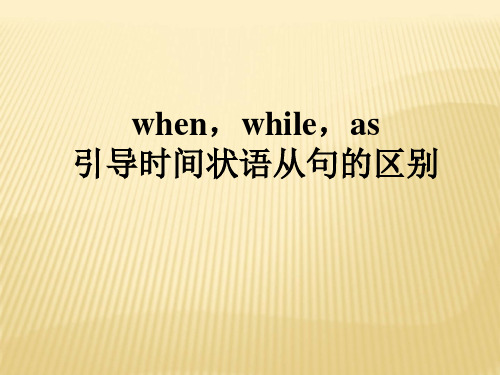
(listen为延续性动词)学生们边听课边做 笔记。
二、when从句的谓语动词可以在 主句谓语动作之前、之后或同时发 生;while和as从句的谓语动作必须 是和主句谓语动作同时发生。
1.从句动作在主句动作前发生,只用 when。 ①When he had finished his homework,he took a short rest. (finished先发生)当他完成作业后,他休 息了一会儿。
when,while,as 引导时间状语从句的区别
when,while,as显然都可以引导时间 状语从句,但用法区别非常大。
一、when和as可以和延续性动词(时 间段)连用,也可以和短暂性动词(时间 点)连用;而while只能和延续性动词(时 间段)连用。 ① Why do you want a new job when
you’ve got such a good one already? (get为短暂性动词) 你已经找到如此好的工作,为何还想再找 新的?
② It began to rain heavily while we were having dinner?
(have为延续性动词)我们正吃晚饭时, 天开始下起大雨。
②When I got to the airport,the guests had left. (got to后发生)当我赶到飞机场时,客人 们已经离开了。
2.从句动作和主句动作同时发生,且从句 动作为延续性动词时,when,while,as都 可使用。
①When/While/As we were dancing,a stranger came in. (dance为延续性动词)当我们跳舞时,一 位陌生人走了进来。
when, while和as also,too和as well as 用法
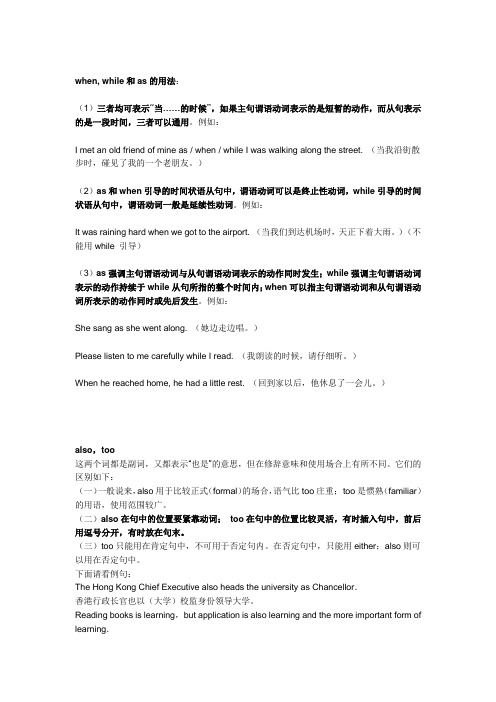
when, while和as的用法:(1)三者均可表示“当……的时候”,如果主句谓语动词表示的是短暂的动作,而从句表示的是一段时间,三者可以通用。
例如:I met an old friend of mine as / when / while I was walking along the street. (当我沿街散步时,碰见了我的一个老朋友。
)(2)as和when引导的时间状语从句中,谓语动词可以是终止性动词,while引导的时间状语从句中,谓语动词一般是延续性动词。
例如:It was raining hard when we got to the airport. (当我们到达机场时,天正下着大雨。
)(不能用while 引导)(3)as强调主句谓语动词与从句谓语动词表示的动作同时发生;while强调主句谓语动词表示的动作持续于while从句所指的整个时间内;when可以指主句谓语动词和从句谓语动词所表示的动作同时或先后发生。
例如:She sang as she went along. (她边走边唱。
)Please listen to me carefully while I read. (我朗读的时候,请仔细听。
)When he reached home, he had a little rest. (回到家以后,他休息了一会儿。
)also,too这两个词都是副词,又都表示“也是”的意思,但在修辞意味和使用场合上有所不同。
它们的区别如下:(一)一般说来,also用于比较正式(formal)的场合,语气比too庄重;too是惯熟(familiar)的用语,使用范围较广。
(二)also在句中的位置要紧靠动词;too在句中的位置比较灵活,有时插入句中,前后用逗号分开,有时放在句末。
(三)too只能用在肯定句中,不可用于否定句内。
在否定句中,只能用either;also则可以用在否定句中。
下面请看例句:The Hong Kong Chief Executive also heads the university as Chancellor.香港行政长官也以(大学)校监身份领导大学。
When_While_As引导时间状语从句的区别
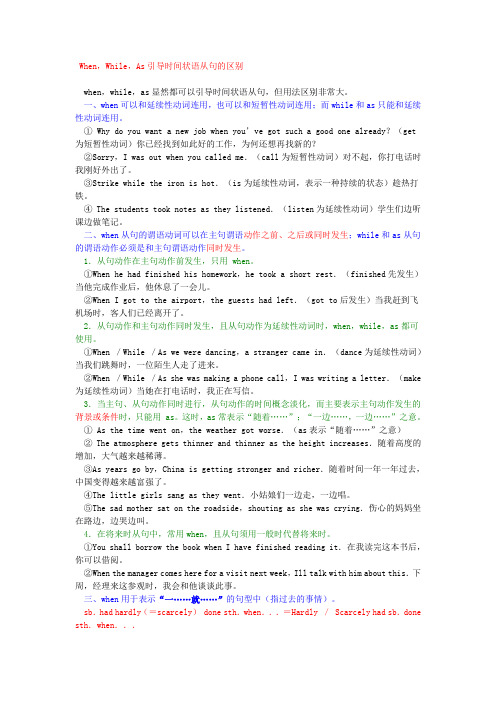
When,While,As引导时间状语从句的区别when,while,as显然都可以引导时间状语从句,但用法区别非常大。
一、when可以和延续性动词连用,也可以和短暂性动词连用;而while和as只能和延续性动词连用。
① Why do you want a new job when you’ve got such a good one already?(get 为短暂性动词)你已经找到如此好的工作,为何还想再找新的?②Sorry,I was out when you called me.(call为短暂性动词)对不起,你打电话时我刚好外出了。
③Strike while the iron is hot.(is为延续性动词,表示一种持续的状态)趁热打铁。
④ The students took notes as they listened.(listen为延续性动词)学生们边听课边做笔记。
二、when从句的谓语动词可以在主句谓语动作之前、之后或同时发生;while和as从句的谓语动作必须是和主句谓语动作同时发生。
1.从句动作在主句动作前发生,只用 when。
①When he had finished his homework,he took a short rest.(finished先发生)当他完成作业后,他休息了一会儿。
②When I got to the airport,the guests had left.(got to后发生)当我赶到飞机场时,客人们已经离开了。
2.从句动作和主句动作同时发生,且从句动作为延续性动词时,when,while,as都可使用。
①When /While /As we were dancing,a stranger came in.(dance为延续性动词)当我们跳舞时,一位陌生人走了进来。
②When /While /As she was making a phone call,I was writing a letter.(make 为延续性动词)当她在打电话时,我正在写信。
when,while和as引导时间状语从句的用法

when,while和as引导时间状语从句的⽤法when, while 和as 引导时间状语从句的⽤法⼀、when 的⽤法如果只从现象来看,when 从句⽤的最多的是⼀般过去时,⽽主句的时态没有限制,根据具体情况⽽定。
1. When he was a child he was always trying out new ideas.他⼩时候就常常试验⼀些新的设想。
2. When she came into my room, I was just reading a book. 她⾛进我房间时,我正在看书。
3. Were you writing when the teacher came in? ⽼师进来的时候,你在写信吗?4. Sorry, I was out when you called me. 对不起,你打电话来的时候我出去了。
5. He was on the point of leaving when someone knocked at the door.他正要⾛,这时有⼈敲门。
6. I thought of it just when you opened your mouth. 就在你要说话的时候,我也想到了。
7. I had hardly[scarcely] closed my eyes when someone knocked at the door.我刚⼀闭上眼,就有⼈在敲门了。
根据以上的例句,我们可以总结出⼀点:when 从句的A事件,相当于另⼀个事件B发⽣的时间点。
也就是说,when 从句的重点不在动作本⾝发⽣的状态,⽽只是把它作为⼀个时间点,所以when 多数情况下⽤的是⼀般过去时,则不⽤正在进⾏时。
因为如果⽤正在进⾏时,它表⽰的就是⼀段时间⽽不是⼀个时间点了。
根据这⼀点,有的⽂章补充说:when 从句的动词⼤多是瞬时动词。
这种说法也可以参照。
实际上,when 从句也可以有其它的时态,但⼏乎也不⽤进⾏时,因为它也只是作为⼀个时间参照点。
while,when,as用法

他刚迷迷糊糊地睡下,这时电话铃就响了。
三、as的用法 1. 引导时间状语从句: during the time when; while 在……期间;当……时候
As she grew older, she kept more to herself. 随着年龄的增长,她变得更沉默了。
She kissed him goodbye, as usual. 她同平常一样和他吻别。 5. [用于在陈述中增加或插入评论] 正如… As you can see, I didn't go after all. 你看,我毕竟没有去。
while, when与as用法辨析:
(1) while引导时间状语从句作“当……时 候”讲时,只能与延续性动词连用。
既然他们从不听讲,他们怎么能指望学到 东西呢?
4. 引导条件状语从句:if 如果
When the weather is good, I usually go to the country. 若是天气好的话, 我总是 到乡下去。
5. 连接并列句:after which; and just then 一……就……,正在这时
二、when的用法 1. 引导让步状语从句:although 虽然, 然而,可是
I'm saying it now when I should have told you long ago. 我早就应该告诉你了,可是我现在才说。
2. 引导时间状语从句:at / during / after the time that 在/当……时;在……之后
while, when, as用法:
- 1、下载文档前请自行甄别文档内容的完整性,平台不提供额外的编辑、内容补充、找答案等附加服务。
- 2、"仅部分预览"的文档,不可在线预览部分如存在完整性等问题,可反馈申请退款(可完整预览的文档不适用该条件!)。
- 3、如文档侵犯您的权益,请联系客服反馈,我们会尽快为您处理(人工客服工作时间:9:00-18:30)。
when, while 和 as 引导时间状语从句的用法这三个词的意思很简单,都有“当……时候”的意思。
但学生经常会问三个词的区别在哪儿,特别是在做选择题的时候。
别说是学生,就我个人而言,做这样的选择题要保证百分之百的正确也是不可能的。
现根据大量的实例和个人的思考,做一点小结,供大家参考。
一、when 的用法如果只从现象来看,when 从句用的最多的是一般过去时,而主句的时态没有限制,根据具体情况而定。
When he was a child he was always trying out new ideas.他小时候就常常试验一些新的设想。
when she came into my room I was just reading a book.她走进我房间时,我正在看书。
Were you writing when the teacher came in?老师进来的时候,你在写信吗?Sorry,I was out when you called me.对不起,你打电话来的时候我出去了。
He was on the point of leaving when someone knocked at the door.他正要走,这时有人敲门。
I thought of it just when you opened your mouth.就在你要说话的时候,我也想到了。
I had hardly[scarcely] closed my eyes when someone knocked at the door.我刚一闭上眼,就有人在敲门了。
根据以上的例句,我们可以总结出一点:when 从句的A事件,相当于另一个事件B发生的时间点。
也就是说,when 从句的重点不在动作本身发生的状态,而只是把它作为一个时间点,所以when 多数情况下用的是一般过去时,则不用正在进行时。
因为如果用正在进行时,它表示的就是一段时间而不是一个时间点了。
根据这一点,有的文章补充说:when 从句的动词大多是瞬时动词。
这种说法也可以参照。
实际上,when 从句也可以有其它的时态,但几乎也不用进行时,因为它也只是作为一个时间参照点。
例如:When I got to the airport,the guests had left.当我赶到飞机场时,客人们已经离开了。
When he had finished his homework,he took a short rest.当他完成作业后,他休息了一会儿。
Why do you want a new job when you have got such a good one already?你已经找到如此好的工作,为何还想再找新的?You shall borrow the book when I have finished reading it.在我读完这本书后,你可以借阅。
When the manager comes here for a visit next week,Ill talk with him about this.下周,经理来这参观时,我会和他谈谈此事。
二、while 的用法相比于when 来说,while 从句的侧重点就不一样了。
while 从句的侧重点在于描述动作正在发生的状态,它的意思是:当while 事件正在发生的时候,另一件事如何如何。
所以,w hile 从句一般用的是正在进行时。
而另一件事的状态没有硬性的要求,根据具体情况而定。
例如:While my wife was reading the newspaper, I was watching TV.当妻子正在看报纸的时候,我正在看电视。
While Jim was mending his bike, Lin Tao came to see him.正当吉姆修自行车时,林涛来看他。
While they were talking , the bell rang.正在他们谈话的时候,上课铃响了。
You can’t do your homework while you’re watching TV.你不能一边看电视一边做家庭作业。
While John was sitting biting his nails, I was working out a plan to get us home. 约翰坐在那里咬指甲时,我想出了一个回家的办法。
从时间的角度来看,while 表示的是一段时间,是一个过程。
这是while 的侧重点。
因此,如果含有“一段时间”的含义的时候,就可以用while。
例如:Strike while the iron is hot. 趁热打铁。
这句话中,是说趁着铁是热的这段时间,赶紧打铁。
如果换成 when 意思就变了,相当于说铁只热了一下,打一下,然后铁就冷了。
这显然不符合文意。
再例:—I'm going to the post office.—While you're there, can you get me some stamps?三、as 的用法1、as 从句表示的也是一件事情正在发生,另一件事也正在进行当中。
但与 while 从句不同的是,as 从句用的一般不用正在进行时,而只是一般过去时。
as 从句一般可以翻译成“边……边……”。
例如:As my mother sang those old songs, tears ran down her cheeks.当我妈妈唱起那些老歌时,眼泪顺着她的脸颊流了下来。
The students took notes as they listened.学生们边听课边做笔记。
As we talked on, he got more and more excited.我们继续往下谈的时候,他越来越兴奋。
The little girls sang as they went.小姑娘们一边走,一边唱。
Just as he caught the ball, there was a tearing sound.当他抓住球的时候,有一种撕裂的声音。
2、as 表达的事件,往往只是主句动作发生的背景或条件时,as 只是一个次要的时间说明,不像while 从句有强调 while 动作本身的意思。
因此,as 常常翻译成“随着……”之意。
例如:As the time went on,the weather got worse.随着时间的推移,气候更加糟糕。
The atmosphere gets thinner and thinner as the height increases.随着高度的增加,大气越来越稀薄。
As years go by,China is getting stronger and richer.随着时间一年一年过去,中国变得越来越富强了。
3、少数情况下,如果强调动作正在发生,as 从句也可以用正在进行时。
这只能算是特例了。
The sad mother sat on the roadside,shouting as she was crying.伤心的妈妈坐在路边,边哭边叫。
As we was going out, it began to snow.我们出门时,开始下雪了。
He came in as I was going to bed.正要上床睡觉,他进来了。
四、when, while, as 的互换如果从句动作和主句动作同时发生,并且从句动作为延续性动词时,when,while,as 可以互换使用。
这种情况下,它们的细微区别恐怕连英、美人自己也说不清了。
When /While /As we were dancing,a stranger came in.当我们跳舞时,一位陌生人走了进来。
[dance 为延续性动词]When /While /As she was making a phonecall,I was writing a letter.当她在打电话时,我正在写信。
[make为延续性动词]While/When/ As I was walking down the street, I noticed a police car in front of the bank.我顺着马路往前走时,发现银行门前停着一辆警车。
[附]常用的表示时间的关联词常用关联词:when, as, while, as soon as, while, before, after, since , once,,till, until 等。
特殊关联词:the minute, the moment, the second, every time, the day,the instan t, immediately , directly, instantly, no sooner … than, hardly …when, scar cely … when 等。
例句:I didn’t realize how special my mother was until I became an adult.The children ran away from the orchard the moment they saw the guard.No sooner had I arrived home than it began to rain.Every time I listen to your advice, I get into trouble.。
